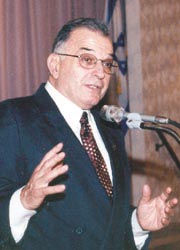 Liacouras details challenges in education to NE group
Liacouras details challenges in education to NE groupBY AUDREY HAWKINS Correspondent Due to the changing marketplace brought about by lightning-quick delivery of electronically-based education, Temple University President Dr. Peter Liacouras last week presented members of the Oxford Circle Jewish Community Center with strategic initiatives aimed at focusing on the major dilemmas of higher education. "We must adjust to the market and not lose sight of the fact that we are a university," Liacouras said. Temple's prime initiative is to transform the University into a regional institution, not simply an urban campus. An agreement was reached with three suburban colleges allowing students who are attending a community college to complete their associates degree as a community college student, and then work toward a Temple degree under the same roof Liacouras said. In addition to Temple s main campus in North Philadelphia and its Ambler campus, the school is planning to open a third campus in the western suburbs, he said. Not only is Temple developing a regional institution, it s developing a national and international Internet distancelearning personality as well. Temple will be offering at least 40 of these distancelearning programs by next fall. The sun never sets on Temple University. We re on every time zone, Liacouras said. Temple is the largest university in America now. Temple is topranked in Athens, TelAviv and Rome for it s law schools, Liacouras said. Another Temple goal, Liacouras said, is to transform the main campus into a residential campus. Six thousand students will be living near or on campus he predicted. Liacouras said he is dedicated to keeping at all costs the highest academic standards in all degree programs, while maintaining high standards with the pressures that constantly face administrators, faculty, and trustees. Undergraduate programs get the most attention and are the greatest challenge. That is a commitment that Temple will see through, he said. "The challenge," Liacouras said, "is to improve the undergraduate entering class at the bottom and to eliminate students who need enormous amounts of remedial help. They would first go to community colleges to prove themselves." Of course, this would not be a problem, he said, because of easy transfer programs. Liacouras believes society will still have universities in the future, but they will be located on the information superhighway. "If we pursue all these initiatives, we still may be on the wrong track, he said. It could be that in 25 years lectures will be heard from your homes or televisions."
Back to Front Page | News Archives | Contact Us | Advertising
The Week In Review | Police Report | Community Calendar | Trips |